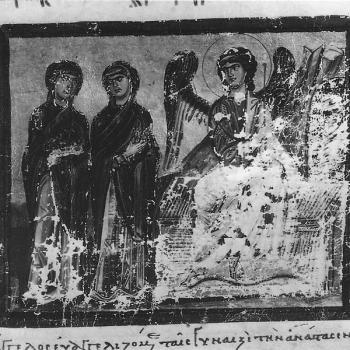Among the twelve apostles, we see a variety of personalities and interests. Peter was bold, but sometimes foolish. Matthew was converted while on the job. Philip was an ally for the Greek community. John was deep and philosophical. The different representations, both good and bad, inspire us to follow Christ more closely, regardless of our faults and failings. Yet among the twelve, no name is more reviled than that of Judas Iscariot.
I’ve often said it’s a shame that we don’t know more about the work of Judas prior to his betrayal of Jesus. Now, that is literally all he’s known for – and will forever be remembered as the one who sold out not just his friend, but his Savior. As the betrayer, he’s often an uncomfortable topic for Christian teaching. We don’t like to think of what he did to Jesus, nor do we dare to think that there’s a message in his story for all of us. Regardless, there are important lessons for us in the story of Judas Iscariot – and here we will examine what those are.
Who was Judas Iscariot?

Judas Iscariot was an outsider among the other twelve. Rather than being from the region of Galilee, Judas’ last name – Iscariot – reveals he was from a different region entirely. His name means “man from Kerioth,” a town in south Judea (Joshua 15:25). We have no details on his life. There’s no knowledge of his family background, marital status, if he had children, or what he did before following Jesus. His name means “praise God,” and is a variation on the name Judah. As we know Jesus was of the tribe of Judah, this is another way by which Jesus was betrayed by one of His own (possibly His own tribe).
It’s noteworthy to say that we have no “call of Judas.” Where we are able to read other apostles were called by Jesus to follow Him, Judas appears to have tagged along. He’s also clearly always identified as the “one who betrayed Jesus.”
However, the Bible does identify Judas as one of the twelve. The Gospel writers don’t indicate there was anything unique in his spiritual life.
Jesus called His twelve disciples to Him and gave them authority to drive out impure spirits and to heal every disease and sickness.
These are the names of the twelve apostles: first, Simon (who is called Peter) and his brother Andrew; James son of Zebedee, and his brother John; Philip and Bartholomew; Thomas and Matthew the tax collector; James son of Alphaeus, and Thaddaeus; Simon the Zealot and Judas Iscariot, who betrayed Him. (Matthew 10:1-4, NIV)
Judas’ walk with Jesus
The Bible indicates Judas cast out demons, healed the sick, raised the dead, and cleanse lepers (Matthew 10:1). He was endowed with the same authority as others. He was also the treasurer, in charge of the group’s money. It doesn’t seem on the surface as if the other apostles thought much of his position, even though Jesus spoke of being betrayed by one of them.
When evening came, Jesus was reclining at the table with the Twelve. And while they were eating, He said, “Truly I tell you, one of you will betray Me.”
They were very sad and began to say to Him one after the other, “Surely You don’t mean me, Lord?”
Jesus replied, “The one who has dipped his hand into the bowl with Me will betray Me. The Son of Man will go just as it is written about Him. But woe to that man who betrays the Son of Man! It would be better for him if he had not been born.”
Then Judas, the one who would betray Him, said, “Surely you don’t mean me, Rabbi?”
Jesus answered, “You have said so.” (Matthew 26:21-25, NIV)
Yet his experience as treasurer – and his ministry – weren’t free from rebuke. According to two incidents found in John’s Gospel, it would appear John recalled a few things in hindsight that gave away Judas’ future betrayal.
One is a devil
Yet there are some of you who do not believe.” For Jesus had known from the beginning which of them did not believe and who would betray him. 65 He went on to say, “This is why I told you that no one can come to me unless the Father has enabled them.”
From this time many of His disciples turned back and no longer followed Him.
“You do not want to leave too, do you?” Jesus asked the Twelve.
Simon Peter answered Him, “Lord, to whom shall we go? You have the words of eternal life. We have come to believe and to know that You are the Holy One of God.”
Then Jesus replied, “Have I not chosen you, the Twelve? Yet one of you is a devil!” (He meant Judas, the son of Simon Iscariot, who, though one of the Twelve, was later to betray Him.) (John 6:64-71, NIV)
Stealing from the treasury
Six days before the Passover, Jesus came to Bethany, where Lazarus lived, whom Jesus had raised from the dead. Here a dinner was given in Jesus’ honor. Martha served, while Lazarus was among those reclining at the table with Him. Then Mary took about a pint of pure nard, an expensive perfume; she poured it on Jesus’ feet and wiped His feet with her hair. And the house was filled with the fragrance of the perfume.
But one of His disciples, Judas Iscariot, who was later to betray Him, objected, “Why wasn’t this perfume sold and the money given to the poor? It was worth a year’s wages.” He did not say this because he cared about the poor but because he was a thief; as keeper of the money bag, he used to help himself to what was put into it.
“Leave her alone,” Jesus replied. “It was intended that she should save this perfume for the day of my burial. You will always have the poor among you, but you will not always have Me.” (John 12:1-8, NIV)
It’s evident that while Judas might have done the things everyone else did, he also did things that were problematic. Never quite on the up-and-up, Judas displayed sneaky, suspicious behavior far away from the eyes of the other disciples.
Judas Iscariot betrays Jesus
In a distinguishing note, Judas Iscariot is described in just about every single New Testament reference as being “the one who betrayed Him” (Matthew 10:4, Mark 3:19, Mark 14:10, Luke 6:16, John 6:71, John 12:4, John 13:26). As his singular feat, Judas decides to betray Jesus after Jesus rebukes him for criticizing Mary’s anointing of Jesus’ feet.
Then Satan entered Judas, called Iscariot, one of the Twelve. (Luke 22:3, NIV)
Then one of the Twelve—the one called Judas Iscariot—went to the chief priests and asked, “What are you willing to give me if I deliver Him over to you?” So they counted out for him thirty pieces of silver. From then on Judas watched for an opportunity to hand Him over. (Matthew 26:14-16, NIV)
Evidently, Judas left the others after the Last Supper and went to find the authorities. Next we see him handing Jesus over to death in the Garden of Gethsemane:
While He was still speaking, Judas, one of the Twelve, arrived. With him was a large crowd armed with swords and clubs, sent from the chief priests and the elders of the people. Now the betrayer had arranged a signal with them: “The one I kiss is the man; arrest Him.” Going at once to Jesus, Judas said, “Greetings, Rabbi!” and kissed Him.
Jesus replied, “Do what you came for, friend.”
Then the men stepped forward, seized Jesus and arrested Him. (Matthew 26:47-50, NIV)
Judas Iscariot hangs himself
Scripture tells us Judas regretted his decision to betray Jesus. He knew Jesus was innocent of their charges, and he knew he’d done the wrong thing. At that point, though, there was nothing he could do. Filled with remorse, Scripture indicates he committed suicide by hanging.
When Judas, who had betrayed Him, saw that Jesus was condemned, he was seized with remorse and returned the thirty pieces of silver to the chief priests and the elders. “I have sinned,” he said, “for I have betrayed innocent blood.”
“What is that to us?” they replied. “That’s your responsibility.”
So Judas threw the money into the temple and left. Then he went away and hanged himself. (Matthew 27:3-5, NIV)
Reiterated again in Acts 1:18-19:
(With the payment he received for his wickedness, Judas bought a field; there he fell headlong, his body burst open and all his intestines spilled out. Everyone in Jerusalem heard about this, so they called that field in their language Akeldama, that is, Field of Blood.) (NIV)
What can we learn from Judas Iscariot?
It might seem strange to think we can learn anything from the one who ensured Jesus would see death. Still, he is part of the Gospel message, whether we like it or not. We can’t have the ultimate message of overcoming death without Judas turning Jesus over to die. It’s an unfortunate reality, but in this world, Jesus’ death had to happen and according to certain means. In keeping with that, Judas Iscariot has something to offer all of us.
The fact that Judas’ betrayal was known by Jesus in advance – and offers us spiritual lessons – doesn’t change that Judas did something very wrong with inalienable consequences. There were no take-backs, no do-overs, no “I’m sorry” to make light of what he did. There was no way for him to continue life as he knew it, for betraying Jesus would forever hang over his head. Judas didn’t do what he did with a good or “eternal picture” in mind. Much like someone might betray someone and then that person goes on to overcome in the long run doesn’t redeem the act of betrayal. Jesus’ triumph over death doesn’t change what Judas did, why he did it, or that it couldn’t be undone.
This being said, what can we learn from Judas?
Actions have consequences
We don’t like the idea that “I’m sorry” doesn’t fix everything we do wrong. It’s uncomfortable to think that some things have long-term, even eternal consequences to them. It’s often our greatest hope that as we move on from something, others can also do the same. This doesn’t always happen, and we must learn to be accountable for the things we do wrong rather than running away from them and hoping we can receive absolution anywhere but from God.
Guilt, fear, condemnation, and hopelessness in the face of sin are all very real things. Forgiveness is also real. Judas didn’t find the opportunity to seek such, but we can. Thank God for forgiveness.
We too will face betrayal
It’s too fanciful to think human nature doesn’t infiltrate the church, especially when it comes to things such as pride and betrayal. Judas spent all that time with Jesus and still thought He wouldn’t call out his motives, intentions, and wrongdoing (even though Jesus called out others, as well!). Too many Christians – and people in general – hope we will just skip over the things we do wrong and focus only on the things we do that everyone else also does. Faith isn’t about blending in with everyone! Betrayal is part of the process; it helps us die to ourselves and launch to new life, relying more on Christ. This doesn’t make it any less painful, or any less difficult. It does, though, make it very real as we experience something that Christ, too, experienced. In this way, may betrayal help us draw to Him.
Jesus didn’t treat Judas any different
Jesus still sent out Judas Iscariot. He ate with him. He shared His teachings with him. Judas was given the same opportunity to learn, grow, and excel with the other apostles. If there’s anything we can recognize, it’s that the ultimate end of Judas’ story didn’t change the process. Judas still had the best teacher in the world who treated him with love and kindness, even knowing the end from the beginning.
In this same light, Judas didn’t stop Jesus, either. Jesus continued to do what needed to be done, even though a betrayer was in His midst. He didn’t modify His teachings to make Judas comfortable, nor did His ministry revolve around the fact that Judas was there. Whether before or after his betrayal, Judas never stopped Jesus.
Jesus loved Judas
Jesus referred to Judas as “friend” (Matthew 26:50). There was no question that, despite Judas’ evil assignment, Jesus still loved Judas. To those who haven’t had a Judas experience, it’s unfathomable. To those of us who have, it’s understandable. Judas-style betrayal doesn’t come from those we can’t stand; it comes from those to whom we are closest, love dearly, and invest our time and energy. Even when we see it coming, it still hurts in a way that other offenses often don’t.
They also teach us something powerful about love. Jesus loved Judas – the one who treated him the worst – and knowing he would. If Jesus could love Judas, Jesus can also love any one of us, no matter what we’ve done. Every time we love despite betrayal, we touch the love of Jesus in a way we didn’t know was possible.
Summary
Judas Iscariot’s story has a completely different ending than the other apostles. He reminds us that motives and actions both matter. Even though little things may go unnoticed by others, God still notices them within us. Just because people appear powerful doesn’t mean they are, at the end of the day, really with us. Yet rather than walking in fear of Judas, we should do what Jesus did – and operate unmoved, in love. Resurrection awaits those who have been betrayed. Ends of all sort follow betrayers.














